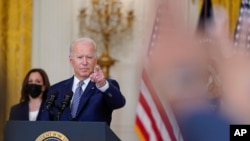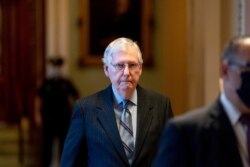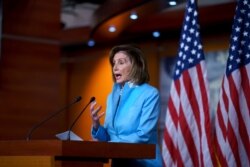"Today, we proved that democracy can still work," U.S. President Joe Biden said after senators from both parties came together to approve a $1 trillion infrastructure plan.
The 69-30 Senate vote sends the legislation to the House of Representatives for consideration next month.
House passage is less certain, with some progressive Democrats saying the total spending is too little. But the president hailed Tuesday's action as moving a step closer to "a once-in-a-generation investment in our nation's infrastructure."
If approved, the package will initiate one of the biggest public endeavors in decades in the United States to fix deteriorating roads and bridges, expand broadband internet service, and replace lead pipes used to convey drinking water.
Biden thanked by name the Republican leader in the Senate, Kentucky's Mitch McConnell, for supporting the bill.
McConnell and 18 other Republicans joined all 50 members of the Democratic caucus to approve the infrastructure legislation.
Republicans who supported it ignored pleas from former president Donald Trump to vote against it.
"I have quietly said for years that Mitch McConnell is the most overrated man in politics — now I don't have to be quiet anymore," Trump said in a statement just prior to the Senate vote.
While in office, Trump supported an even bigger infrastructure package that never came to fruition.
"After years and years of 'infrastructure week,' we're on the cusp of an infrastructure decade that I truly believe will transform America," Biden said, contrasting his legislative effort to that of his predecessor.
"Bipartisan collaboration is the only way to create durable policy in a divided country," Jason Grumet, founder and president of the Bipartisan Policy Center, said in a statement. "The hard work and courage exhibited by Senators from both parties and the White House deserves recognition, but there is more work to be done. We encourage the House to act quickly to advance this legislation and make a positive difference in the lives of every American."
House Speaker Nancy Pelosi released a statement saying her chamber will continue to work with the Senate "to ensure that our priorities For the People are included in the final infrastructure and reconciliation packages, in a way that is resilient and will Build Back Better."
The For the People Act contains sweeping voting rights legislation previously passed by the House.
The infrastructure spending package — nearly half of it composed of new government funding — would also build new sewers, expand passenger rail and transit systems, and modernize airports.
A group of 10 centrist Republican and Democratic lawmakers agreed more than a month ago on the outlines of the deal, but it took the weeks since then to craft the specifics of the bill, which exceeds 2,700 pages.
Biden said the legislation would "create millions of good union jobs all across the country," most of them in the construction trades.
Senator Mike Lee was one of the Republicans who voted against the bill, calling it a drastic expansion of federal power and contending that it exacerbates "our already dangerous inflation."
The legislation's taxes and regulation "will hamper and harm our infrastructure," Lee added in a tweeted statement.
Biden has previously stated that the spending is essential for economic growth and to compete with America's chief economic rival, China.
"This is the type of infrastructure investment manufacturers have long championed, and the bipartisan approach shows that our legislators can indeed still come together to accomplish transformational change," National Association of Manufacturers President and CEO Jay Timmons said in a statement. "We now urge members of the House to follow the Senate's example, pass this bipartisan bill and send it to the president's desk for his signature without delay."
Next on tap for the Senate is consideration of Biden's much larger $3.5 trillion social safety net legislation that would provide universal prekindergarten instruction, free community college classes, expanded health care for older Americans and child care funding. It would also fund the fight against the effects of climate change, make immigration law changes and attempt to lower prescription drug prices.
Republicans are uniformly panning the proposal, and so far, none support it.
Democrats in the Senate are hoping to band together to pass the outlines of the spending on a 51-50 vote, with Vice President Kamala Harris casting the tiebreaking vote. But it could take months of negotiations in both the Senate and House, in conjunction with Biden and his aides, to spell out the specifics of the legislation.







